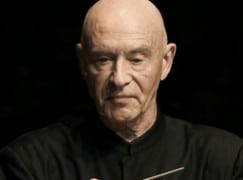Slipped Disc editorial: Why Christoph Eschenbach attracts controversy
mainFrom his earliest steps in music, the German pianist and conductor was drawn to the centre of power. A protege of Herbert von Karajan, he was befriended by the German chancellor Helmut Schmidt and recorded with him (and Justus Frantz) the Mozart triple piano concerto on EMI.
His first post as music director was in ultra-rich Zurich (1982-86). His second was in oil-well Houston (1988-1999), where he built a loyal following among musicians and audiences.
A capable, at times inspirational, conductor, his hallmarks were designer-cut coats, a lifestyle to match, and an entourage of soloist friends who seldom matched his musical calibre. In Houston, these attributes passed unnoticed.
It was only when Eschenbach was announced in 2003 as music director in Philadelphia that they drew critical attention. Although musicians were represented on the search committee, he had not conducted the orchestra for four years and his previous engagements had been unsatisfactory. The atmosphere did not improve over time; when Eschenbach’s contract was renewed, the musicians were reported to be 80 percent against him. There was a similar response at the Orchestre de Paris, which declined during his tenure (2000-2010).
In 2008, he transferred to the National Symphony Orchestra in Washington after a brilliantly orchestrated whisper campaign by his agent to suggest that he was in line for the New York Philharmonic. He fee was far above expectations and the results have been inconsistent, a mixture of the memorable and the capricious. Ever personable, Eschenbach made himself agreeable to DC society and to a section of the musicians.

But his mind was often elsewhere and he ate too many cherries off the cake. Last summer he stepping in for the first of three Mozart operas in Salzburg in the middle of an orchestra tour. He earned a hostile response and was accused of wrecking the festival’s centrepiece. His Magic Flute in Vienna was dismissed as flabby.
His renewal in Washington this week was another inside job where friendship and connections took precedence over the needs of the orchestra and the city. His programming next season, from which American music is absent, is insensitive. No other candidate was considered by a lame-duck management. There is only one winner in Washington these days and it is not the music.





Comments